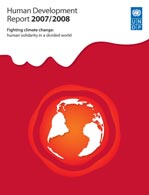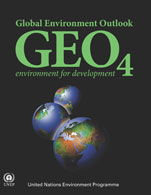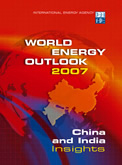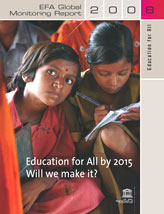UN and other global reports covering sustainable development challenges
This page provides a gateway to some key UN and other global reports. Collectively these reports provide an overview of the state of the world, and our progress in addressing key sustainable development challenges such as energy, environment, and education.
| Human Development Report 2007/2008 Fighting climate change: Human solidarity in a divided world Climate change is the defining human development challenge of the 21st Century. Failure to respond to that challenge will stall and then reverse international efforts to reduce poverty. The poorest countries and most vulnerable citizens will suffer the earliest and most damaging setbacks, even though they have contributed least to the problem. Looking to the future, no country�however wealthy or powerful�will be immune to the impact of global warming. As the Human Development Report 2007/2008 argues, climate change poses challenges at many levels. In a divided but ecologically interdependent world, it challenges all people to reflect upon how we manage the environment of the one thing that we share in common: planet Earth. It challenges us to reflect on social justice and human rights across countries and generations. It challenges political leaders and people in rich nations to acknowledge their historic responsibility for the problem, and to initiate deep and early cuts in greenhouse gas emissions. Above all, it challenges the entire human community to undertake prompt and strong collective action based on shared values and a shared vision. Click here for other Human Development reports. |
 |
Global Environment Outlook: environment for development (GEO-4) The United Nations Environment Programme says that major threats to the planet such as climate change, the rate of extinction of species, and the challenge of feeding a growing population are among the many that remain unresolved, and all of them put humanity at risk. The warning comes in UNEP�s Global Environment Outlook: environment for development (GEO-4) report published 20 years after the World Commission on Environment and Development (the Brundtland Commission) produced its seminal report, Our Common Future. GEO-4, the latest in UNEP�s series of flagship reports, assesses the current state of the global atmosphere, land, water and biodiversity, describes the changes since 1987, and identifies priorities for action. GEO-4 is the most comprehensive UN report on the environment, prepared by about 390 experts and reviewed by more than 1 000 others across the world. The Global Environment Outlook (GEO) is UNEP�s flagship assessment process and report series. The fourth report in the series, GEO-4 provides an overview of the global and regional environmental, social and economic state-and-trends over the past two decades. It highlights the interlinkages, challenges and opportunities which the environment provides for development and human well-being. The report also presents an outlook, using four scenarios to explore plausible futures to the year 2050, as well as policy options to address present and emerging environmental issues. |
 |
| World Energy Outlook 2007 - China and India Insights The huge energy challenges facing China and India are global energy challenges and call for a global response. The World Energy Outlook 2007 charts a course to a more secure, competitive, lower-carbon energy system � a course that must involve the world�s two emerging giants�, said Nobuo Tanaka, Executive Director of the International Energy Agency (IEA) today in London at the launch of the latest edition of the Outlook. The annual flagship publication of the IEA this year focuses on energy developments in China and India and their implications for the world. �WEO-2007 demonstrates more clearly than ever that, if governments don�t change their policies, oil and gas imports, coal use and greenhouse-gas emissions are set to grow inexorably through to 2030 � even faster, in fact, than in last year�s Outlook. These trends would threaten energy security and accelerate climate change. But the Outlook also shows how new policies can pave the way to an alternative energy future�. |
 |
Education for all by 2015: Will we make it? The number of children starting primary school has increased sharply since 2000, there are more girls in school than ever before and spending on education and aid has risen. That�s the good news, according to the sixth edition of the Education for All Global Monitoring Report, released by UNESCO today. But on the down side, poor quality, the high cost of schooling and persisting high levels of adult illiteracy are undermining the chances of achieving education for all* by 2015. The report regrets that national governments and donors have emphasized formal primary schooling at the expense of early childhood and adult literacy programmes. These programmes have a direct impact on achieving universal primary education and gender parity, and more broadly on poverty reduction. Children from the poorest backgrounds are those who stand to benefit most from early childhood care and education programmes. Despite measures in many countries to expand access to pre-primary education, participation levels remain below 20% in the Arab States and sub-Saharan Africa, and under 40% in South and West Asia on average. Governments, the report finds, are also neglecting adult literacy: worldwide 774 million adults � nearly 1 in 5 - lack basic literacy skills. External financing for basic education remains far short of the US$11 billion required annually to reach EFA in low-income countries. |
 |
